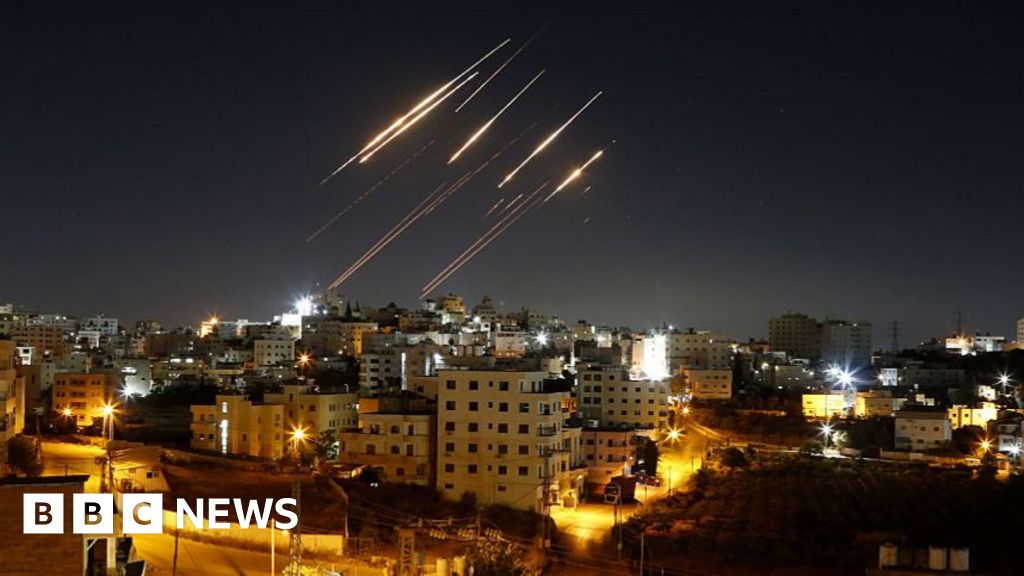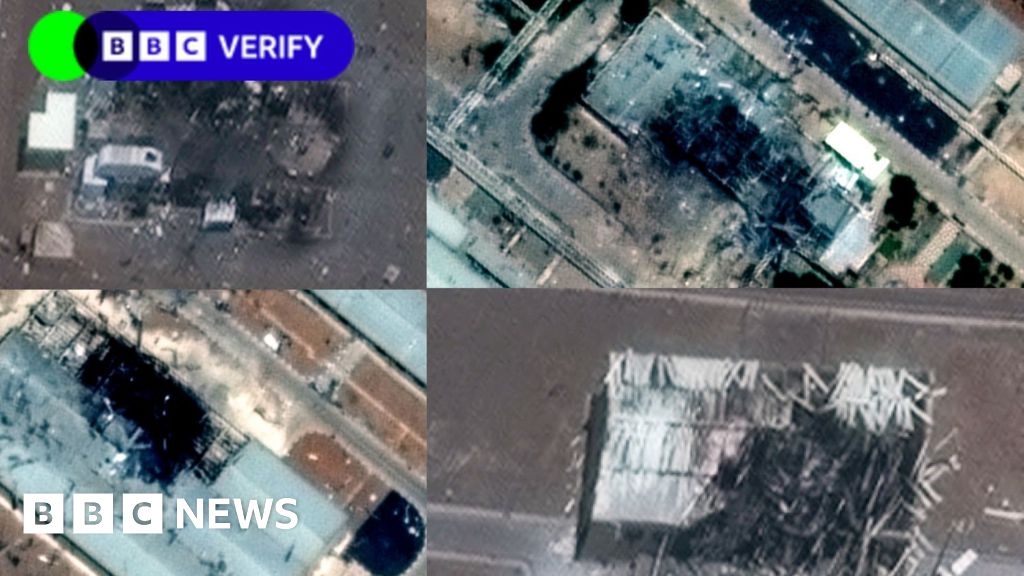ARTICLE AD BOX
By Joel Gunter
in Lviv, Ukraine
Women and children queue at Lviv station for a train to Poland. Hundred of thousands are passing through the station every day
When Svitlana Maksymenko's train pulled into the Ukrainian capital Kyiv, about halfway through her 800-mile journey from home to safety, people pushed onto every part of the carriage, she said, grasping for their own escape route west. Some abandoned their luggage. Some begged to get on.
"They were on their knees on the platform," Maksymenko said. "There was no room. There were people standing in every space, in every gangway, there were five people on every bed."
Maksymenko's journey began in Kharkiv, an eastern city that has been heavily shelled by Russian forces, and stopped, for now, in Lviv, a picturesque western city about 50 miles from the Polish border with a grand central station that has become a waypoint for hundreds of thousands of refugees.
In almost every corner of the station concourse over the weekend, in the waiting rooms, the underpasses and all along the stretches of platform, there were people taking shelter, sleeping, anxiously waiting, rushing for trains. There were tense moments as volunteer stewards tried to hold back the crowds of people massed at entry gates, fearful of missing their chance to escape. Women with children wept with the stress, clutching their passports and family birth certificates in one hand and their children in the other. Outside the station, there were tearful goodbyes as fighting-age men, banned from leaving Ukraine, stopped and let their families go, unsure if they would ever see them again.
There were tense moments as stewards attempted to hold back crowds anxious to make the trains
By the time she reached Lviv, Maksymenko had been on the train with her parents-in-law and three-year-old daughter for 26 hours. Some reported longer journeys. Maksymenko was a drop in a river of people that began flowing into Lviv when Russia invaded and swelled over the past few days as Russian forces escalated their campaign of bombing against Ukrainian civilians.
"We estimate 30,000 people arrived on Thursday, 100,000 people on Friday and at least a 100,000 more on Saturday," said Viktoria Khrystenko, a Lviv city council official helping to manage the influx of refugees.
"We are doing our best to cope but we have never seen anything like this," she said. "We are expecting more people. It might be millions. It's a disaster. These people have nothing, just one bag because they had only three minutes to run and save their lives."
Lviv station was heaving with people on Friday night, thinning only slightly as trains departed for Poland before filling again with new arrivals from the bombed-out cities in the north, east, and south of Ukraine. Outside, Kolya, 46, was standing with tears streaming down his face, watching his wife and two teenage daughters walk away from him.
"I hope they will make it safely to Europe, I want so badly to be with them," he said. "This is as far as I can go."
Ukraine has banned men aged 16-60 from leaving the country, unless they have a disability or three children under 18. They are stopped in document checks at the station or at border crossing points further west. Kolya had stood for 10 hours on the train from Kyiv to ensure his family reached Lviv safely, he said, and now he would make the same journey back to join his 19-year-old son and his brothers in the fight against Russia.
"I will go back to Kyiv and defend my city. It is my home," he said. "How, I don't know - I have asked them for a gun, but how will I protect my city from missiles with a gun?"
Poland's government began sending buses over the weekend to bring Ukraine's refugees over the border to safety.
Kolya's wife and children would press on to Poland, whose government has sent trains and buses to bring people from Ukraine into its country, sparing tens of thousands of refugees traumatic journeys to the border and long waits to cross by foot.
By Sunday, more than 1.5 million Ukrainians had crossed into Poland, according to the UN. Hundreds of thousands more were on the move inside Ukraine.
Amid the chaos in the station at Lviv, volunteers and fellow travellers helped the very young and the very old, carrying pushchairs and suitcases up and down the stairs to the platforms, marshalling children to rooms upstairs where they could get a hot meal, and helping the elderly wherever they could.
"Physically it was very hard for me of course, people were pushing very hard," said Dusia Kostiuk, 91, who boarded a train in Kharkiv at 9pm on Friday, arrived in Lviv at midnight on Saturday, and spent the next 15 hours in a queue at the station to move on Poland.
"Our house was still there when we left but shelling was happening all around and we were told that terrible shelling is happening there now," Kostiuk said.
"We didn't take anything with us, I took two dresses and that's it.
"I was born and raised in Kharkiv. I didn't really travel before, I don't like to travel. I never thought I would leave my home like this."
Dusia Kostiuk, 91, spent 27 hours on a train from the heavily bombed city of Kharkiv to Lviv.
Many of those arriving in Lviv, like Kostiuk, stay in the station until they can board a train to Poland - some bedding down for a night or longer, in any free corner. The air inside the grand waiting rooms and gangways was thick with the heat and odour of a mass of people who have been on the move for many days.
Many who cannot move straight on to Poland head out into the city looking for temporary shelter. At a small theatre in Lviv's historic old town, 20 beds had been arranged for those who needed to spend up to three nights in the city before they can leave.
Olha Adamenko, 32, arrived there on Sunday evening with her husband and sick two-year-old daughter. They had driven over four days from Kyiv, stopping in shelters along the way. But the shelter in the theatre was already at capacity and it was not clear whether there was going to be a bed there for her that night, the staff said.
It was a problem many would face that night, according to Khyrstenko, the city official, who said all of the roughly 20,000 temporary beds in the city were already taken.
At the theatre, Adam Yemchenko, a volunteer, was preparing to turn people away. "Most people arrive later than this but people getting to us tonight won't get a bed, we will have to send them somewhere else," he said.
"Some will carry straight on to the border but they face an eight hour wait there in the cold."
Refugees rest in a shelter in a small theatre in Lviv. By early evening on Sunday the shelter was full and turning people away.
This was a choice facing Adamenko, as she sat down inside the small theatre foyer looking tired and stressed. She stopped to breastfeed her daughter, who was restless and tearful. Her husband would soon have to leave them here in Lviv and travel back to Kyiv to join the territorial defence forces.
She asked the volunteers at the shelter how to reach the Polish border by bus and which were the best border crossings.
"Maybe we will go tonight," she said. But she was worried, there were long queues at the crossing points and it was the depth of winter.
"I heard people are queuing outside there during the day but at night locals take them into their homes, but I don't know if it is true," she said. "I am worried about the baby, she is sick and tired."
Adamenko was also starting to worry more about her husband. She thought their local defence battalion on the outskirts of Kyiv would be relatively safe, but heavy fighting surrounded it over the weekend in the districts of Bucha and Irpin.
"Maybe that means the Russians will go through our neighbourhood next," she said.
A young boy leaves Ukraine on a bus bound for Poland. Thousands of children have spent hours away from home.
As night fell, Adamenko and her husband left the theatre and walked into Lviv with directions to another shelter, where if she could find a bed they would part - one on to safety abroad, one back to danger at home.
Later on Sunday night, at the station, many thousands more people were still arriving and departing. They formed queues that were as orderly as possible under the circumstances and they continued to help one another. Volunteers bustled through the crowds with trays made from cardboard boxes, handing out tea and snacks in plastic cups.
While all that was happening, Viktoria Khrystenko, the council official, was driving her own three children to the Polish border. They had left on Sunday morning, and by early Monday morning they had been in the car nearly 24 hours through the bitterly cold night.
Eventually they crossed in to Poland and Khrystenko left her children with relatives and began the long return journey to Lviv. As she drove, she wept.
"I'm sorry, I'm emotional because I didn't sleep at all," she said. "I had a task to take my kids to a safe place across the border and I have done that, so now I need to go back to Lviv and continue to help."
Khrystenko was born here in Lviv. She had never been more proud of its people, she said. They were "ready to give away their last package of buckwheat or can of food" to help others. "We have only one Ukraine and we need to save it," she said.
She hung up and drove on, headed for her three-room apartment in the city, where there were 17 women and children from all over Ukraine resting after long journeys to Lviv. She had taken home as many people from the station as she could, she said.
Outside Lviv station, fire barrels, lit during the nights to keep the crowds warm, smouldered.
Orysia Khimiak and Svitlana Libet contributed to this report.

 3 years ago
53
3 years ago
53








 English (US) ·
English (US) ·